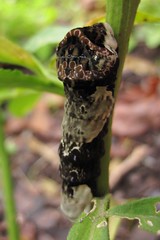 Last week’s blog post featured the second Vermont record for caterpillars of the Giant Swallowtail caterpillars, and the northernmost sighting of this species in the state. Abby Colihan found them while working in the garden in her backyard. But how did Abby ever know to think they might be rare? How many rarities like this are overlooked? And how might you, too, discover a rare critter in your own backyard?
Last week’s blog post featured the second Vermont record for caterpillars of the Giant Swallowtail caterpillars, and the northernmost sighting of this species in the state. Abby Colihan found them while working in the garden in her backyard. But how did Abby ever know to think they might be rare? How many rarities like this are overlooked? And how might you, too, discover a rare critter in your own backyard?Whether it be bird, butterfly, or anything else, a few simple tricks can help reduce the chances that some scarce critter wanders across your gaze undetected.
1) Get outside and look! Pay attention to what’s around you. The more you are out observing nature, the better a feel you will get for what is common and what is not. It doesn’t take studying the names of critters to recognize them… or to recognize that they are unfamiliar.
2) Expect the unexpected. Rare creatures show up every year in Vermont, and chances are, most go unnoticed. David Sibley has blogged about this phenomenon, and has even put a percentage to the rare birds that go unseen. You can’t find what you’re not looking for!
3) Document what you see. If something looks unfamiliar, take a picture! Digital photography has revolutionized the way we can record the natural world, and as a result, many more rare critters are being not only seen, but confirmed.
4) Share your observation! So many times, a rare bird is discovered to the delight of some ecstatic birder, only for them to hear from a neighbor that “it’s been there for weeks!” Call or stop by your local Nature Center, seek out an email list or discussion forum, or swing by your local extension office. You’re likely to find plenty of amateur and professional naturalists who are happy to help you identify your discovery.
The above steps will certainly not guarantee that you find a rare critter. Most people don’t (that’s what makes them rare). But, chances are, when a vagrant bird shows up at your feeder, you'll be more likely to take note. So get outside, observe the wild things around you, pay attention, and you just might discover the next Giant Swallowtail.
As a final primer for your search for rarity, enjoy the following awareness test:

No comments:
Post a Comment